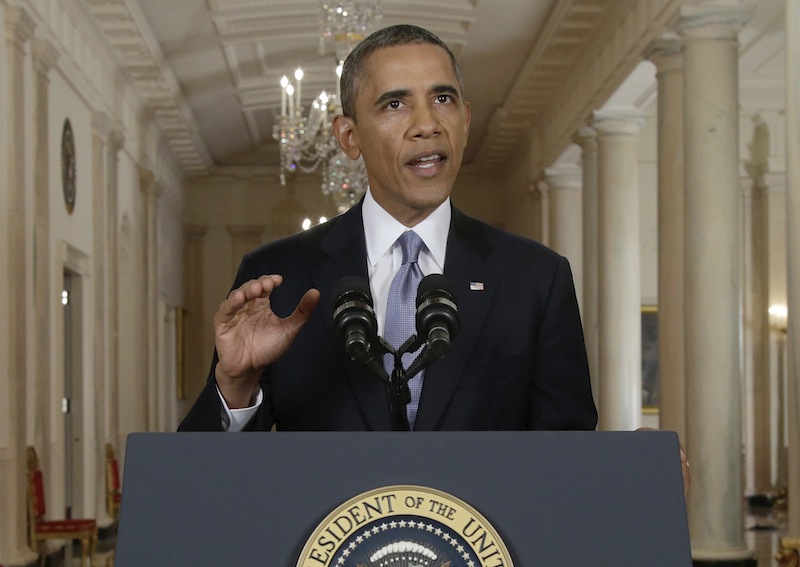President Obama said Tuesday night that he had asked Congress to postpone any action related to Syria’s use of chemical weapons and let the diplomatic process continue — and Congress seemed glad to relinquish the issue back to the executive branch.
The Syrian government signaled earlier Tuesday that it was open to a Russian proposal to relinquish chemical weapons stockpile. “I have, therefore, asked the leaders of Congress to postpone a vote to authorize the use of force while we pursue this diplomatic path,” Obama said in his address to the nation.
It’s a startling turn after Senate Majority Leader Harry Reid (D-NV) had originally planned to hold the first full Senate vote on Wednesday, a plan he later reversed as doubts about the whip count lingered and news of a diplomatic alternative broke.
Congress was never keen about voting on war, torn between public opposition to the president’s proposed strikes and their ideological or political allegiances. According to TPM’s whip count, 44 senators and 152 representatives never took a public position. A handful completely flipped their position in the last week, underlining their uncertainty.
But with Obama pursuing diplomacy again and asking for a vote delay, the onus is off Congress. Reading between the lines, there seemed to be a collective sigh of relief from Capitol Hill.
“A credible diplomatic solution at the United Nations is the best possible outcome for the United States and the world community,” Sen. Kirsten Gillibrand (D-NY), who had been undecided, said in a statement. “We must fully exhaust this developing opportunity before determining whether to authorize U.S. military action.”
Several members, particularly Democrats who might have be weighing a tough vote against their party’s leaders, appeared to rhetorically sigh in relief.
“America should bring the world together to condemn and penalize Syria for this action,” Sen. Jeff Markley (D-OR) said in a statement. “Such an effort, however, is best pursued through international negotiation and diplomacy.”
“I am hopeful that a verifiable, enforceable and timely diplomatic solution will be the American and world response to Syria’s deplorable actions,” Sen. Richard Blumenthal (D-CT), another undecided Democrat who had voiced concerns about the resolution passed by the Senate Foreign Relations Committee that was coming to the Senate floor, said in a statement.
While some members still said that Congress should act on military authorization, others warned against it.
“Resolutions that would escalate the situation toward military action are reckless and risk dismantling the delicate international agreement,” Sen. Tom Udall (D-NM), who voted against the resolution in committee, said in a statement.
Work is still underway on an amendment to the committee’s resolution that would reflect the changing diplomatic reality. But the timeline is uncertain, given the president’s request and the potential that the crisis will be resolved diplomatically. Sen. Bob Corker (R-TN) told reporters earlier on Tuesday that a vote would not be happening anytime soon. Senate aides for members involved in the drafting of new language for the resolution indicated to TPM that there is much less urgency in getting something passed.
Sen. Bob Menendez (D-NJ), chairman of the Foreign Relations Committee, suggested after Obama’s speech that the new diplomatic strategy could be the best path forward.
“The diplomatic door has opened ever so slightly and while I have doubts about this 11th hour offer, it would be wrong to slam the door shut without due consideration,” he said in a statement. “A negotiated solution to a crisis is always preferable and if this possibility is legitimate, I’ll give it serious thought.”









